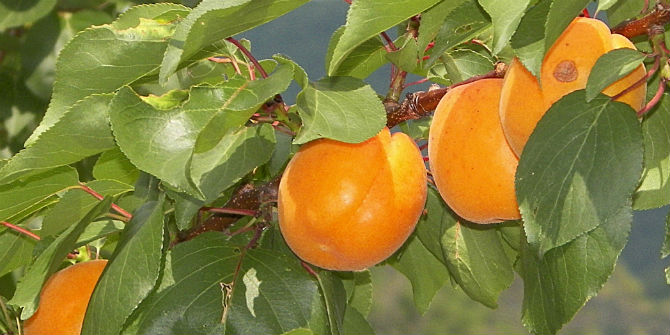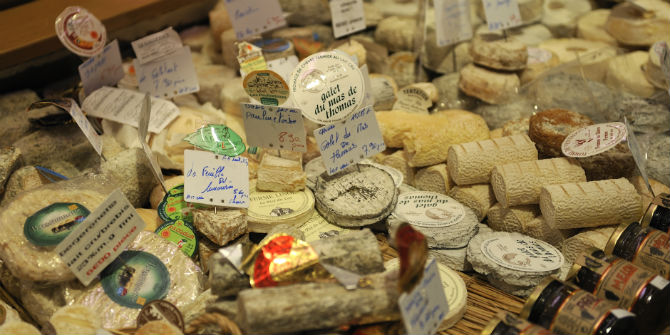
 In a new briefing paper, ‘Food, the UK and the EU: Brexit or Bremain?‘, Tim Lang and Victoria Schoen argue that post-Brexit the food world “will be characterised by volatility, disruption and uncertainty”, as the cost of imports will rise if sterling falls. They also discuss the urgent need for continued reform of the Common Agricultural Policy. In this extract from the paper, they explain how food and agriculture were central to the founding mission of the EU.
In a new briefing paper, ‘Food, the UK and the EU: Brexit or Bremain?‘, Tim Lang and Victoria Schoen argue that post-Brexit the food world “will be characterised by volatility, disruption and uncertainty”, as the cost of imports will rise if sterling falls. They also discuss the urgent need for continued reform of the Common Agricultural Policy. In this extract from the paper, they explain how food and agriculture were central to the founding mission of the EU.
Agriculture and what is today termed ‘food security’ were founding planks of the European policy the UK is now to vote on. In 1957, after an experiment in 1951 with setting up a Steel and Coal Community, six countries – Germany, France, Italy, Belgium, Netherlands and Luxembourg – signed the Treaty of Rome, which remains still the legal basis of what is now the EU but was then known as the Common Market. Legal summaries of the terrain this Treaty has now spread into are provided by the European Commission. Back in the 1950s, food and farming were major concerns in mainstream politicians’ minds. Europe had emerged from a devastating war, characterised by death and food disruption. Rationing had been common (based upon novel nutrition insights). In the UK, technically a victor, old Empire-based supply chains had been exposed as strategically vulnerable and failing to serve all its citizens well. Respected critics had prophesied that these weaknesses were already exposed in the 1930s. Certainly, in World War 2, the UK learned fast that it needed to produce more food itself and ensure it was fairly distributed. It learned the cost of wasting food and taking the short-term view that cheapness is the only important goal in food policy. Security, quality, distribution and equality matter, too.

After the war, food concerns were a significant feature in planning the reconstruction: supporting farmers from booms and slumps, making more good food affordable for working people, creating new institutional structures at home, in Europe and globally, and setting up welfare systems to prevent 1930s-style hunger. Policymakers knew that the food system was not a hermetically sealed system; it both reflected and affected other elements in the political economy. Hunger in the 1930s had not been helped by the Wall Street Crash, the global recession and the unemployment that followed. In the UK, these considerations featured as it too reconstructed after the war. Enormous attention went into preventing what is now called ‘food insecurity’ globally and nationally. The welfare system was to provide a safety net which included the cost of a decent diet. New schemes such as the NHS and school meals were developed. Farm support and marketing schemes were expanded. The Agriculture Act 1947 was passed to give a policy infrastructure to prevent a 1930s style farm recession. This, it was hoped, would prevent the UK food supply being exposed as it had been in the recent war.
This kind of policy development was common across Europe and the Western world. It began to be prepared and planned even in the war. This is the context out of which the European Union emerged. The political intent was to put the centuries of European tension – economic, political, military – behind us. The UK was actively involved in creating this new Europe. Even then some of the tensions we see today were already apparent not just in the UK but across Europe: the politics of free trade versus managed markets, the Atlanticists versus nationalists or nascent Europeans.
What is the point of the EU: peace, progress and food security?
The British are right to ask: ‘what is the purpose of the EU?’ Whatever the views today, two original motives should be acknowledged: it was to build a peaceful Europe, and better mechanisms than war and economic dislocation in managing the political economy. Food was a key strand within these, fuelled by commitment to end the folly of hunger and distorted markets that had characterised the 1930s. Public health analysts had documented how poor health due was due to low income and unemployment. They joined the calls to replace them through strategic and economic security, cross-border collaboration, solidarity, and the reframing of capitalism itself. The goal was peace through prosperity.
It is not sentimental to remind ourselves of these motives. The EU has been poor at rebutting anti-EU ribaldry. Its association with ‘bent bananas’, ‘food mountains’, ‘wine lakes’, etc., bring cynicism and forgetfulness. Sometimes the criticisms have been deserved: there was stupid over-production and surplus dumping in the 1980s, as Conservative MP Sir Richard Body (and others) pointed out. It is no excuse to state that the EU was not alone in this practice; the USA dumped too. Like any vast international engagement, the EU may lose its way at times – one can argue it currently suffers just such a loss of purpose – and it may irritate this or that faction. But we should not forget that the intent was to create peaceful collaboration rather than wars as a way of resolving conflicts over issues like food.
In some respects, the EU deserves credit for its food and farming policy; this has contributed to the food peace in the form of cheaper raw ingredients and security of supply for the urban majority. But it has also seeded great discontent such as over the dumping of surpluses in the developing world (now, if not halted, certainly notionally being addressed), the creation of cheap commodities for a food industry which over-produces possibly too cheaply, and nutritionally impoverished processed foods. It has also deliberately haemorrhaged farm employment. Dr Sicco Mansholt, architect of the CAP and its first Commissioner, understood the tendency to overproduction, and he introduced measures in the 1960s (watered down but agreed in 1972) to reduce the numbers of farmers. His and the CAP’s goal was to maintain farmer incomes, not necessarily farmer numbers. This labour-shedding from the land has continued. In 2000-12, an estimated 4.8m ‘agricultural worker units’ (i.e. full-time equivalents) disappeared in Europe. Such policies have been created often in the name of the conventional economic goals of competitiveness and market efficiency. On the one hand, the EU has given an emphasis to consumer interests. On the other hand, it is frequently criticised as answering the needs of Big rather than Small food businesses. On one feature, there is agreement. The EU is a multi-state collaboration. Some like this. Others don’t.
This post represents the views of the authors and not those of BrexitVote, nor the LSE.
Full references can be found in the briefing paper. The Food Research Collaboration is a project, funded by Esmée Fairbairn Foundation, to facilitate joint working by academics and civil society organisations to improve the UK food system. Food Research Collaboration Briefing Papers present reviews of evidence on key food issues identified by and relevant to the FRC membership of academics and CSOs. This extract from the working paper is copyright of the authors.
Tim Lang is Professor of Food Policy at City University, London and chair of the Food Research Collaboration.
Victoria Schoen is the Food Research Collaboration Research Fellow and an agricultural economist by training.






